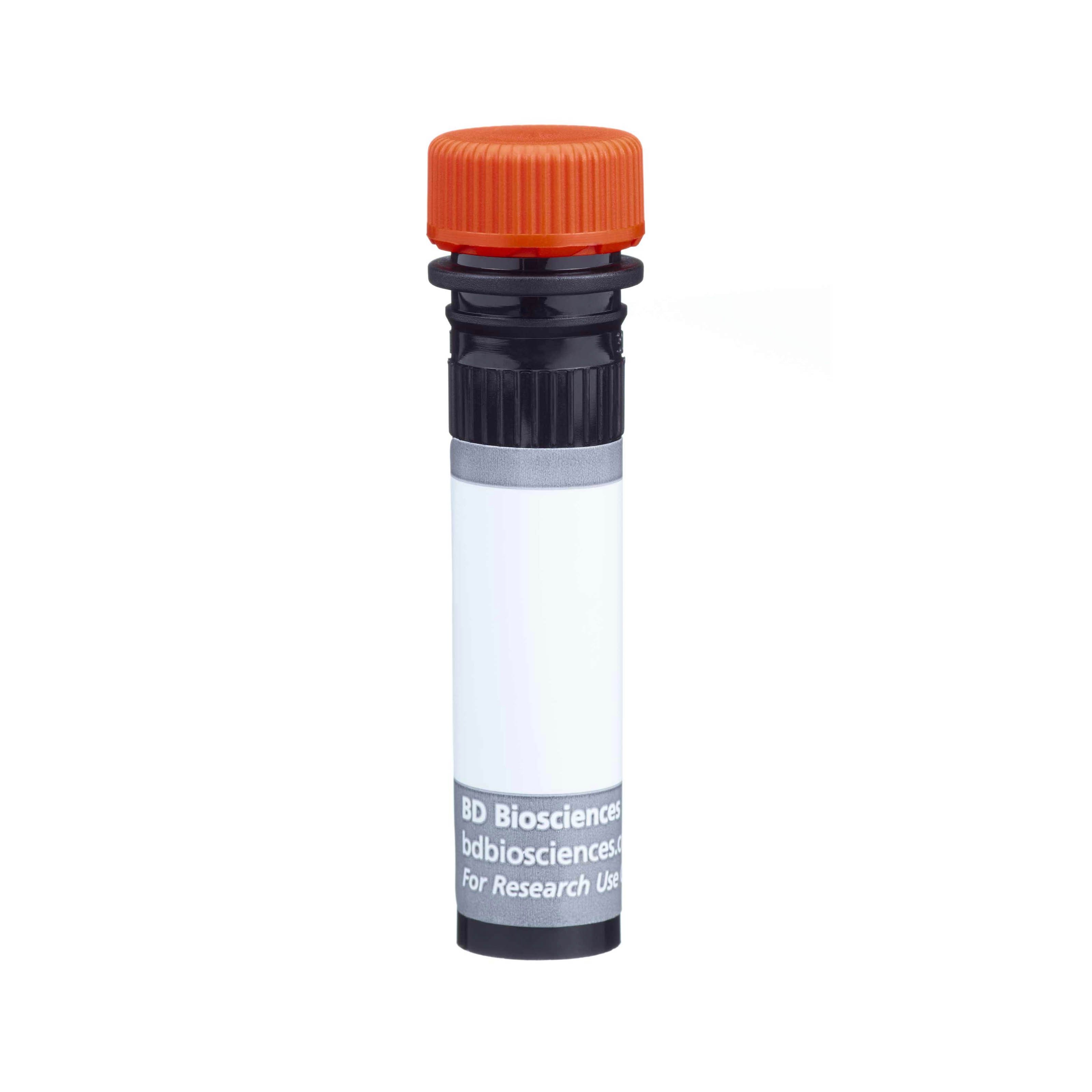Old Browser
Looks like you're visiting us from {countryName}.
Would you like to stay on the current country site or be switched to your country?


Regulatory Status Legend
Any use of products other than the permitted use without the express written authorization of Becton, Dickinson and Company is strictly prohibited.
Preparation And Storage
Recommended Assay Procedures
For optimal and reproducible results, BD Horizon Brilliant Stain Buffer should be used anytime two or more BD Horizon Brilliant dyes (including BD OptiBuild Brilliant reagents) are used in the same experiment. Fluorescent dye interactions may cause staining artifacts which may affect data interpretation. The BD Horizon Brilliant Stain Buffer was designed to minimize these interactions. More information can be found in the Technical Data Sheet of the BD Horizon Brilliant Stain Buffer (Cat. No. 563794).
Product Notices
- This antibody was developed for use in flow cytometry.
- The production process underwent stringent testing and validation to assure that it generates a high-quality conjugate with consistent performance and specific binding activity. However, verification testing has not been performed on all conjugate lots.
- Researchers should determine the optimal concentration of this reagent for their individual applications.
- An isotype control should be used at the same concentration as the antibody of interest.
- Caution: Sodium azide yields highly toxic hydrazoic acid under acidic conditions. Dilute azide compounds in running water before discarding to avoid accumulation of potentially explosive deposits in plumbing.
- For fluorochrome spectra and suitable instrument settings, please refer to our Multicolor Flow Cytometry web page at www.bdbiosciences.com/colors.
- Please refer to www.bdbiosciences.com/us/s/resources for technical protocols.
- BD Horizon Brilliant Stain Buffer is covered by one or more of the following US patents: 8,110,673; 8,158,444; 8,575,303; 8,354,239.
- BD Horizon Brilliant Ultraviolet 737 is covered by one or more of the following US patents: 8,110,673; 8,158,444; 8,227,187; 8,575,303; 8,354,239.
Companion Products






The αR1 monoclonal antibody specifically binds to the human platelet derived growth factor (PDGF) receptor α (PDGFRα), also known as CD140a. CD140a is a 170 kDa single transmembrane glycoprotein expressed on fibroblasts, smooth muscle cells, glial cells and chondrocytes. PDGF receptors α and β are single glycoproteins with intracellular tyrosine kinase domains. They are structurally similar to the M-CSF receptor and CD117 (c-kit). Their ligand, PDGF, is a mitogen for connective tissue cells and glial cells. PDGF plays a role in wound healing and it also acts as a chemoattractant for fibroblasts, smooth muscle cells, glial cells, monocytes and neutrophils. Functional PDGF is secreted in disulfide linked, homodimeric or heterodimeric forms comprised of A or B chains (PDGFAA, PDGF-BB or PDGF-AB). Binding of divalent PDGF induces receptor dimerization with three possible forms: αα, αβ, ββ. The PDGFRα subunit binds both PDGF A and B chains, whereas the PDGFRβ subunit binds only PDGF B chains. Although both receptor subunits can stimulate mitogenic responses, only the β subunit can induce chemotaxis. The αR1 antibody is specific for PDGFRα and does not crossreact with PDGFRβ. It immunoprecipitates human, monkey, rabbit, pig, dog and cat PDGFRα. It does not recognize hamster, rat or mouse PDGFRα.
The antibody was conjugated to BD Horizon™ BUV737 which is part of the BD Horizon Brilliant™ Ultraviolet family of dyes. This dye is a tandem fluorochrome of BD Horizon BUV395 with an Ex Max of 348-nm and an acceptor dye with an Em Max at 737-nm. BD Horizon Brilliant BUV737 can be excited by the ultraviolet laser (355 nm) and detected with a 740/35 filter. Due to the excitation of the acceptor dye by other laser lines, there may be significant spillover into channels detecting Alexa Fluor® 700-like dyes (eg, 712/20-nm filter).
Due to spectral differences between labeled cells and beads, using BD™ CompBeads can result in incorrect spillover values when used with BD Horizon BUV737 reagents. Therefore, the use of BD CompBeads or BD CompBeads Plus to determine spillover values for these reagents is not recommended. Different BUV737 reagents (eg, CD4 vs. CD45) can have slightly different fluorescence spillover therefore, it may also be necessary to use clone specific compensation controls when using these reagents.

Development References (5)
-
Bazenet CE, Kazlauskas A. The PDGF receptor alpha subunit activates p21ras and triggers DNA synthesis without interacting with rasGAP. Oncogene. 1993; 9(2):517-525. (Biology). View Reference
-
Callard R, Gearing A. Callard R, Gearing A. The Cytokine Facts Book. San Diego: Academic Press; 1994.
-
Hart CE, Bowen-Pope DF. CD140a and b (PDGRα and β) Workshop Panel report. In: Kishimoto T. Tadamitsu Kishimoto .. et al., ed. Leucocyte typing VI : white cell differentiation antigens : proceedings of the sixth international workshop and conference held in Kobe, Japan, 10-14 November 1996. New York: Garland Pub.; 1997:739-741.
-
Kitayama J, Springer TA. Endothelial Cell Blind Panel analysis: Overview and summary. In: Kishimoto T. Tadamitsu Kishimoto .. et al., ed. Leucocyte typing VI : white cell differentiation antigens : proceedings of the sixth international workshop and conference held in Kobe, Japan, 10-14 November 1996. New York: Garland Pub.; 1997:717-721.
-
LaRochelle WJ, Jensen RA, Heidaran MA, et al. Inhibition of platelet-derived growth factor autocrine growth stimulation by a monoclonal antibody to the human alpha platelet-derived growth factor receptor. Cell Growth Differ. 1993; 4(7):547-553. (Immunogen). View Reference
Please refer to Support Documents for Quality Certificates
Global - Refer to manufacturer's instructions for use and related User Manuals and Technical data sheets before using this products as described
Comparisons, where applicable, are made against older BD Technology, manual methods or are general performance claims. Comparisons are not made against non-BD technologies, unless otherwise noted.
For Research Use Only. Not for use in diagnostic or therapeutic procedures.
Report a Site Issue
This form is intended to help us improve our website experience. For other support, please visit our Contact Us page.